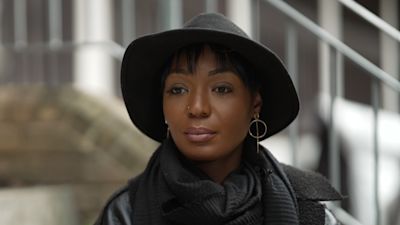Sickle cell disease: Mother welcomes 'revolutionary' new drug but why has it taken so long?

ITV News Health Editor Emily Morgan hears from Chanel Taylor about the pain she's faced with her condition as she waited for a drug like this to come along
A mother who has suffered with sickle cell disease since she was nine-months-old has welcomed the news of a "revolutionary" life-changing drug treatment on the NHS - but asks why it has taken so long.
Diagnosed as a baby, Chanel Taylor says the disease has had a major impact on her life, from education, to relationships, but mostly the "excruciating pain" she has faced.
The 37-year-old told ITV News: "It has impacted my vision... losing my vision has become one of the most difficult moments in my life that I've had to deal with.
"When you look at me, you don't look at me and think I have sickle cell."
"Sickle cell is an invisible disability, it's an invisible condition, which I've struggled with daily, from friends, family, education, and those that just don't understand the condition."
Chanel has to receive regular blood transfusions every five weeks.
Chanel Taylor explains the 'excruciating pain' she lives with due to her condition
What is sickle cell disease and what's the new drug to treat it?
Sickle cell disease – which is particularly common in people with an African or Caribbean background – is a serious and lifelong health condition causing severe pain and organ failure often requiring hospital admission.
The new life-changing drug, known as crizanlizumab, will be delivered by a transfusion drip and works by binding to a protein in the blood cells to prevent the restriction of blood and oxygen supply.
It is the first treatment for the disease in the past 20 years, and will help as many as 5,000 people over the next three years in England.
While Chanel hailed the new drug as "good news" for the sickle cell community, she asked why it has taken so long for a treatment to be developed.
"There's been little research into trying to develop treatment for sickle cell, because there is so much disparity within the community and with other treatment," she told ITV News.
"There's cancer, there's cystic fibrosis, where resource has been pumped into, the development, research and better health equality.
"With sickle cell there's been none, no awareness, no resources, and it saddens me it has taken 37 years for treatment to be developed."
Chanel says there's 'no awareness, no resources' for her condition
Chanel referred to the sickle cell community as a forgotten group of people, until someone passes away, but is using her voice to enact change in the community.
The new drug will reduce the number of times a sickle cell patient needs to go to A&E by two fifths, the NHS said.
People aged over 16 who suffer from multiple sickle cell crises every year will be eligible for the treatment.
NHS chief executive Amanda Pritchard said: “This is a historic moment for people with sickle cell disease who will be given their first new treatment in over two decades.
“This revolutionary treatment will help to save lives, allow patients to have a better quality of life and reduce trips to A&E by almost half.
“The NHS has agreed a deal for this drug, so we are able to provide the latest and best possible treatments for patients at a price that is affordable for taxpayers”.
Sickle Cell Society chair Kye Gbangbola MBA said: “A new treatment brings new hope for people living with sickle cell disorder, the world’s most common genetic blood condition.
“SCD is a medical emergency, it causes excruciating pain, this new treatment will reduce the number of agonising pain episodes we have to endure.
“The hope is improved quality of life for many living with the condition and their families”.